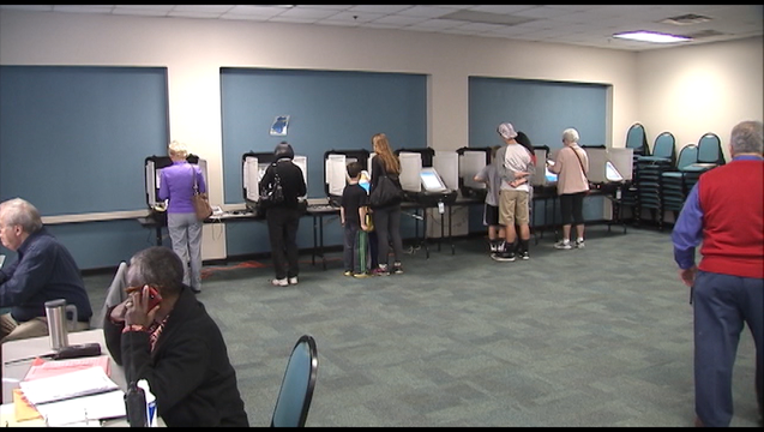Georgia voters hope to influence presidential picks

ATLANTA (AP) - Voters in Georgia get their say in the presidential race Tuesday, with one of the largest delegate totals up for grabs among 12 states.
Georgia's deep-red status and pool of delegates is drawing last-minute visits from multiple Republican candidates ahead of "Super Tuesday." Democrats, meanwhile, know black voters are essential to winning a primary.
Recent polling in the state shows Donald Trump leading the Republican race and Hillary Clinton with a double-digit lead on Vermont Sen. Bernie Sanders.
Secretary of State Brian Kemp, who championed the effort to set the March 1 primary date, said the change gives Georgians a chance to impact both parties' presidential nominee. Republican voters include a variety of people, from evangelicals, to tea party members, to those focused solely on economic issues, he said.
"It's got something for everybody," Kemp said.
Eric Tanenblatt, a Republican consultant who hasn't committed to a campaign following Jeb Bush's exit, said the state tends to break down by region in GOP primaries and ensure delegates are awarded proportionally rather than all going to the popular vote winner.
He expects Ted Cruz to do well in rural parts of the state, including north Georgia, while Marco Rubio and John Kasich will battle for support in metro Atlanta and along the coast.
"I think you're going to see that kind of division across the South, and Tuesday's primary won't clarify much," Tanenblatt said.
A clear second-place victor could make a strong argument that he is the only alternative to Trump, said Andra Gillespie, a political science professor at Emory University. If Rubio distances himself from Cruz, or vice versa, the winning senator will try to win over the other's supporters, she said.
"The question then becomes whether a Cruz voter is comfortable voting for Rubio or would prefer Trump," she added.
Rubio and Cruz held separate rallies in metro Atlanta on Saturday; Rubio plans to return Monday. Trump is expected to speak to supporters in south Georgia on Monday night. John Kasich visited the state in February, holding two overflow town halls north of Atlanta.
The Democratic race, like almost every party primary here, hinges on black voters' support.
Hillary Clinton rallied supporters Friday at Atlanta City Hall, promising to return and help turn the state blue.
"Georgia looks like America," said Tharon Johnson, a Democratic campaign strategist who is supporting Clinton. "We have a prominent and active African-American voting community that both candidates have spent a lot of time galvanizing. Ultimately, Hillary Clinton will win because of her long, proven history of standing up for our issues."
Bernie Sanders spoke before thousands in mid-February at Atlanta's Morehouse College, a historically black school.
State Sen. Vincent Fort, Sanders' top surrogate in Georgia, said he believes Sanders can exceed expectations. Sanders has narrowed polling gaps late in other states and could gain momentum heading into other Southern states with a strong performance this week, Fort said.
"This is not a year for the status quo, and Hillary Clinton is the status quo," Fort said.
Gillespie said Georgia and other Southern states will test whether Sanders can peel away enough support from young black voters to challenge Clinton's expected strength.
"The African-American vote is what drives election results in these primaries, and these are delegate-rich states," she said.
___
Associated Press writer Ryan Phillips contributed to this report from Atlanta.

